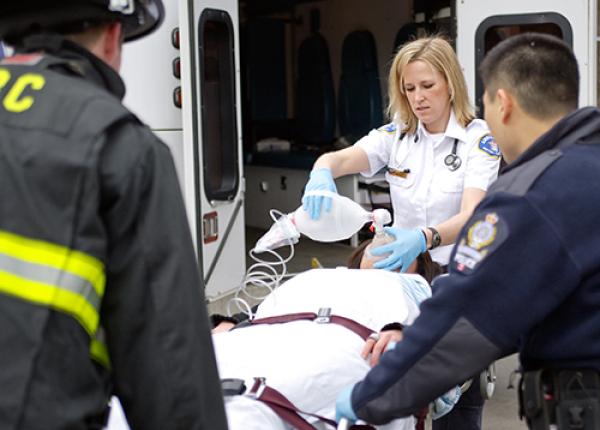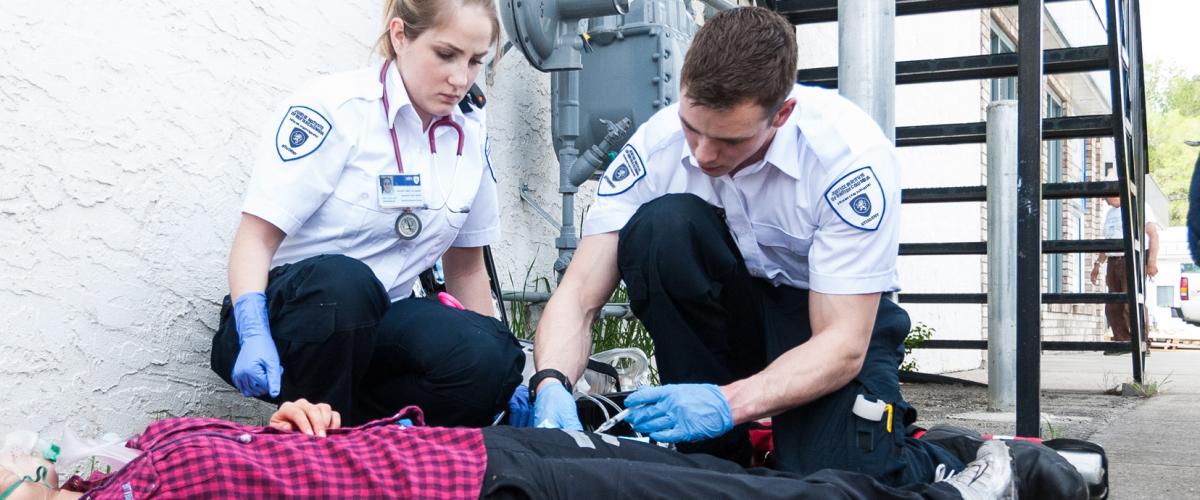
Is this program right for you?
Learn the fundamentals of emergency medicine. This program can help you start your healthcare career.
Secure a Job
EMR graduates may gain employment with BC Ambulance Services, private ambulance services, fire departments, law enforcement, ski patrol and rescue, or remote industrial workplaces.
Step Towards Further Studies
Many EMR graduates use their training as a foundation for further studies in paramedicine. They often continue in Primary Care Paramedic and Advanced Care Paramedic training. They may also earn a diploma or degree in Health Sciences or healthcare, such as nursing and medicine.
Program Strengths
Skilled paramedic field practitioners teach best practices in trauma life support and treatment guidelines. Students will learn core competencies defined by the Paramedic Association of Canada (PAC).
Full class participation is mandatory, and successful completion of exams is required to pass.
Program Format
EMR is now an Associate Certificate in Emergency Medical Responder. This program comprises of two courses: Emergency Medical Responder (PARA-1050) and the new EMR Scope of Practice course (PARA-1055).
The EMR course is 15 days long, Monday to Friday, 8:30 a.m. - 4:30 p.m.
The EMR Scope of Practice course is five days long, Monday to Friday, 8:30 a.m. to 4:30 p.m.
You must complete both courses to earn an Associate Certificate in Emergency Medical Responder.
Note: Existing certified or licensed EMRs who wish to upgrade their license to the new scope changes can take PARA-1055 on its own. Proof of licensure or certification must be submitted, please visit "how to apply" for instructions.
The classroom is busy. You can expect to study each night to review the material learned and to prepare for the next day. Wear comfortable clothing and consider wearing a watch for timekeeping. Bring textbooks, notepads, pens, a watch, food, and water.
This program is delivered in person at JIBC's Chilliwack, Okanagan, Maple Ridge, New Westminster, and Vancouver Island (Victoria) campuses.
Program Update: Exciting Changes to Your Emergency Medical Responder Certificate - June 2025 We’re thrilled to share an important update about your Associate Certificate in Emergency Medical Responder program, starting June 2025! To enhance your learning experience, we’re combining EMR (PARA-1050) with the EMR Scope Update Ministerial Order (PARA-1055) into a single, cohesive course. This merger will streamline content and provide a more integrated educational journey. Plus, a brand-new EMR textbook will be introduced to support your learning with the most up-to-date resources. Stay tuned to this website for upcoming details and scheduling information about the updated program! |
Prerequisites
It is recommended that students have a minimum grade 10 English level.
Date and time
Monday to Friday for full-time, 8:30 am - 4:30 pm.
Student Dress Code
Learn more about the EMR Student Dress Code.
Exams
Students are assessed and coached throughout the course. Formal evaluations are as follows:
EMR
- One midterm: 50 multiple-choice questions
- Basic Life Support (BLS) written exam: 20 multiple-choice questions
- Six skills assessments
- Final comprehensive written exam: 100 multiple-choice questions
- Final practical examinations (one medical scenario/one trauma scenario)
EMR Scope Update Ministerial Order M292
- Final comprehensive written exam: 50 multiple-choice questions
- Five practical Objective Structured Clinical Exams (OSCE)
Students must pass with a minimum of 75% for each of the written and practical exams.
Upon successful completion of the EMR course, students will receive the following:
- JIBC EMR certificate (valid for three years)
- Canadian Red Cross BLS digital card (valid for one year)
Remedial
Students are given an opportunity to do one (1) retest for their final written, medical scenario, and/or trauma scenario should they be unsuccessful in their final exams. Failure to complete this requirement within 60 days after the course end date will result in a ‘FAIL’ grade.
Tuition & Fees
EMR (PARA-1050)
Tuition $1857.25
Learner Services Fee $42.38
EMR Scope Update Ministerial Order M292 (PARA-1055)
Tuition $769.89
Learner Services Fee $3.26
REFUNDS
Continuing Studies Courses (Refund Policy-3210–003)
If a student withdraws seven calendar days before the beginning of the course they receive a 100% refund;
Withdrawal with less than seven calendar days from the start of the course is not eligible for tuition refund;
Some courses may have non-refundable tuition, application, and/or material fees (this will be identified at the time of registration).
To receive a refund please contact Registration.
Textbooks & Supplies
Required Textbooks
- Pearson's, Emergency Medical Responder. A Skill Approach (5th edition) ISBN-13: 9780133946215
- Canadian Red Cross, Basic Life Support Field Guide 2018 ISBN: 978-1-58480-704-9
Pre-Read: Please review chapters 1-4, 6, 10, 14, 18, 29, & 33 in the Emergency Medical Responder: A Skills Approach (5th Edition) before day 1 of class. Once enrolled, students will be emailed additional pre-reading material.
Note: Only the New Westminster Campus has books available for sale.
To purchase your textbooks, you can contact the JIBC Store or your preferred online vendor.
Go to EducationPlannerBC
- Sign up for an account by creating your Username and Password
- Complete your profile (3 sections):
- Personal information
- Contact information
- Academic history
- Start applying. Select your institution: Justice Institute of British Columbia. Create application.
- Select the applicant category as Domestic.
- Select the program you wish to apply for, campus, and term. Select “Save”.
- Review and submit the application.
- Confirm your email address.
- Check boxes for declaration of information and applicant.
- Submit application.
Once you have received confirmation that you have been accepted into the program from Admissions, you can enroll in the two EMR courses (PARA-1050 & PARA-1055). To see dates and locations and enroll online, scroll to "courses in this program" below and click on the links. Alternatively, you can contact Registration at 604.528.5590 or register@jibc.ca.
EMR Scope Update Ministerial Order M292 only (not part Associate Certificate in EMR)
- If you hold a current EMR certification or valid EMR license you can register for PARA-1055, “EMR Scope Update”; you must first apply for a requisite waiver form for the pre-requisite:
- Also, you’ll need to email a copy of your certificate to: requisitewaiver@jibc.ca Once your requisite waiver is approved, you’ll receive an email confirming. Then you can register for the course (PARA-1055).
- To register for the course, please call registration (you won’t be able to register in your student account).
Q: Is my nursing degree equivalent to the EMR level?
A: No. Currently, the BC Ministry of Health's Emergency Medical Assistant's Licensing Board (EMALB), who govern the Emergency Medical Assistant's Regulations, do not allow transferring between nursing and pre-hospital medicine without first completing paramedic education.
Q: Do I need to complete a criminal record check to apply for the EMR course?
A: Currently there are no requirements for a criminal record check to apply for a seat in the EMR course. However, you will likely need to complete a criminal record check for potential employers.
This program focuses on the skills needed to respond to trauma and medical emergencies.
Course Topics
- Fundamentals of Emergency Medicine
- Assessment and Diagnostics
- Medical Conditions and Emergencies
- Traumatic Emergencies and Soft Tissue Injuries
- Diverse Populations and EMS Operations
EMR (PARA-1050)
Upon successful completion of this course the learner will be able to:
- Describe the components of the Emergency Health Services System
- Describes the fundamental principles of anatomy and physiology
- Assess and manage a broad range of life-threatening traumatic and medical emergencies
- Demonstrate a secondary assessment involving history taking and diagnostics
- Demonstrate basic airway and breathing management and critical interventions
- Demonstrate cardiopulmonary resuscitation (CPR) and Automated External Defibrillation (AED)
- Demonstrate spinal-injury management procedures and techniques
- Demonstrate and treat suspected opioid overdose
- Demonstrate the following specific treatments and medical interventions:
- Acute coronary syndrome symptom relief with oxygen, nitroglycerin and acetylsalicylic acid
- Blood glucose sampling and glucose administration to treat diabetic emergencies
- Pain management through the administration of nitrous oxide gas
- Emergency childbirth and neonatal/pediatric basic life support
- Basic first-aid techniques including minor wound care and at-work treatment
- Maintenance and dosage calculations of an intravenous line
- Describe mass casualty and special rescue considerations
EMR Scope Update Ministerial Order M292 (PARA-1055)
Upon successful completion of this course, the learner will be able to:
- Describe the use, limitations, interpretation, and accuracy of carbon monoxide (CO) oximetry testing, referring to physiological manifestations of elevated test results and the treatments.
- Explain the use, application and administration of inhaled and nebulized bronchodilators and intramuscular administration of epinephrine, referring to pathophysiology, sympathetic and parasympathetic nervous systems, anatomical structures, and principles of pharmacology.
- Conduct a respiratory assessment and interpret findings to inform the use and application of a bronchodilator and intramuscular epinephrine.
- Explain the use and application of topical administration of procoagulants and antifibrinolytics, referring to pathophysiology, anatomical structures, and principles of pharmacology.
- Explain the use and application of intranasal opioid antagonists, referring to pathophysiology, anatomical structures, and principles of pharmacology.
- Explain the use and application of intranasal and intramuscular administration of anti-hypoglycemic agents, referring to pathophysiology, anatomical structures, and principles of pharmacology.
- Differentiate between the maintenance of intravenous lines in the prehospital, the in-hospital and hospital-to-hospital transfer environments.
- Explain the maintenance of intravenous lines, access devices and infusions of crystalloid solutions without additives like medications or blood products, referring to pathophysiology, anatomical structures, and principles of pharmacology.
- Explain the use and application of oral analgesia, referring to physiology, pathophysiology, and the principles of pharmacology.
- Demonstrate appropriate use and application of:
Nebulized and inhaled bronchodilators,
Topical administration of procoagulants and antifibrinolytics,
Intranasal administration of opioid antagonists,
Intranasal and intramuscular administration of anti-hypoglycemic agents, and
Intramuscular administration of epinephrine.
Oral analgesia
11. Demonstrate skills in treatments of:
- Patients showing signs of carbon monoxide poisoning,
- Patients showing signs of and experiencing adverse symptoms involving the respiratory system,
- Patients showing signs of and experiencing adverse symptoms involving the immune system,
- Trauma patients including those with penetrating wounds where topical administration of procoagulants and antifibrinolytics might be required,
- Patients experiencing toxicologic syndromes where administration of intranasal opioid antagonists might be required, and
- Patients experiencing adverse signs and symptoms involving the endocrine system where administration of intranasal and/or intramuscular administration of anti-hypoglycemic agents might be required.
- Patients showing signs of and experiencing pain.
Courses In This Program
| PARA-1050 Emergency Medical Responder | PARA-1055 EMR Scope Update M292 |
